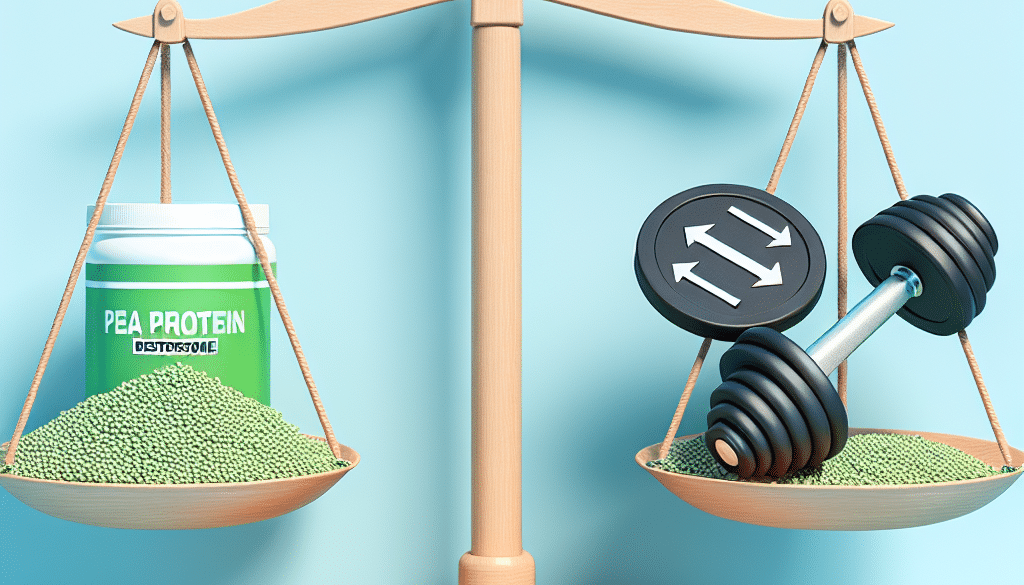Does Pea Protein Decrease Testosterone? The Answer
Table of Contents
- Pea Protein and Testosterone: Unraveling the Truth
- Understanding Testosterone and Its Importance
- The Rise of Pea Protein
- Myths and Misconceptions About Plant Proteins
- Scientific Evidence on Pea Protein and Testosterone
- Case Studies and Anecdotal Evidence
- Comparing Pea Protein to Other Protein Sources
- Conclusion: Pea Protein as a Testosterone-Friendly Option
- ETprotein’s High-Quality Pea Protein Products
Pea Protein and Testosterone: Unraveling the Truth

With the rise of plant-based diets and the increasing popularity of fitness and health consciousness, pea protein has emerged as a staple supplement for many. However, there’s been a growing concern among men regarding the impact of plant-based proteins, like pea protein, on testosterone levels. This article delves into the scientific evidence to address the question: Does pea protein decrease testosterone?
Understanding Testosterone and Its Importance
Testosterone is a crucial hormone in the human body, especially for men. It plays a vital role in muscle growth, bone density, and the development of male sexual characteristics. It’s also important for overall health, influencing mood, energy levels, and even cognitive function.
The Rise of Pea Protein
Pea protein is derived from yellow split peas and is favored for its high protein content and hypoallergenic properties. It’s a complete protein, containing all nine essential amino acids, and is often used as a supplement by vegans, vegetarians, and those with dietary restrictions.
Myths and Misconceptions About Plant Proteins
One common misconception is that plant-based proteins, including pea protein, contain phytoestrogens that could potentially disrupt the body’s hormonal balance and lower testosterone levels. Phytoestrogens are plant-derived compounds that can mimic the effects of estrogen in the body.
Scientific Evidence on Pea Protein and Testosterone
Several studies have investigated the relationship between plant-based proteins and testosterone levels. Here’s what the research says:
- A study published in the “Journal of the International Society of Sports Nutrition” found no significant difference in testosterone levels between whey protein and pea protein consumers.
- Research in the “European Journal of Clinical Nutrition” indicated that diets high in plant-based proteins did not adversely affect testosterone levels in men.
- Another study from the “American Journal of Clinical Nutrition” showed that soy protein, which has higher levels of phytoestrogens than pea protein, did not decrease testosterone levels in men.
These studies suggest that pea protein does not decrease testosterone levels and may be a suitable alternative to animal-based proteins.
Case Studies and Anecdotal Evidence
While scientific studies provide a strong foundation, case studies and personal experiences can offer additional insights:
- Many athletes and bodybuilders who have switched to pea protein report maintaining their muscle mass and strength, indicating no adverse effects on testosterone.
- Health forums and communities often share success stories of individuals who have used pea protein without experiencing hormonal imbalances.
These anecdotal reports further support the notion that pea protein does not negatively impact testosterone levels.
Comparing Pea Protein to Other Protein Sources
When comparing pea protein to other protein sources, it’s important to consider the following:
- Animal-based proteins, like whey and casein, have been the traditional go-to for those looking to increase muscle mass, but they can be problematic for those with lactose intolerance or dairy allergies.
- Other plant-based proteins, such as rice or hemp protein, may not contain all essential amino acids or have lower protein content compared to pea protein.
Pea protein offers a balanced amino acid profile and is a viable option for those seeking a plant-based protein source without compromising testosterone levels.
Conclusion: Pea Protein as a Testosterone-Friendly Option
In conclusion, the current body of scientific research and anecdotal evidence suggests that pea protein does not decrease testosterone levels. It is a safe and effective protein source for individuals looking to maintain or increase muscle mass, improve overall health, and adhere to a plant-based diet without the fear of hormonal disruption.
ETprotein’s High-Quality Pea Protein Products
If you’re considering incorporating pea protein into your diet, ETprotein offers a range of high-quality pea protein products that cater to various needs. Their organic pea protein is characterized by a neutral taste, non-GMO, and allergen-free attributes, making it an excellent choice for those seeking a clean and sustainable protein source.
ETprotein’s commitment to quality ensures that their pea protein products are ideal for anyone looking to support their fitness goals, dietary requirements, or overall health without compromising their testosterone levels.
About ETprotein:
ETprotein, a reputable protein and L-(+)-Ergothioneine (EGT) Chinese factory manufacturer and supplier, is renowned for producing, stocking, exporting, and delivering the highest quality organic bulk vegan proteins and L-(+)-Ergothioneine. They include Organic rice protein, clear rice protein, pea protein, clear pea protein, watermelon seed protein, pumpkin seed protein, sunflower seed protein, mung bean protein, peanut protein, and L-(+)-Ergothioneine EGT Pharmaceutical grade, L-(+)-Ergothioneine EGT food grade, L-(+)-Ergothioneine EGT cosmetic grade, L-(+)-Ergothioneine EGT reference grade and L-(+)-Ergothioneine EGT standard. Their offerings, characterized by a neutral taste, non-GMO, allergen-free attributes, with L-(+)-Ergothioneine purity over 98%, 99%, cater to a diverse range of industries. They serve nutraceutical, pharmaceutical, cosmeceutical, veterinary, as well as food and beverage finished product distributors, traders, and manufacturers across Europe, USA, Canada, Australia, Thailand, Japan, Korea, Brazil, and Chile, among others.
ETprotein specialization includes exporting and delivering tailor-made protein powder and finished nutritional supplements. Their extensive product range covers sectors like Food and Beverage, Sports Nutrition, Weight Management, Dietary Supplements, Health and Wellness Products, and Infant Formula, ensuring comprehensive solutions to meet all your protein needs.
As a trusted company by leading global food and beverage brands and Fortune 500 companies, ETprotein reinforces China’s reputation in the global arena. For more information or to sample their products, please contact them and email sales(at)ETprotein.com today.












